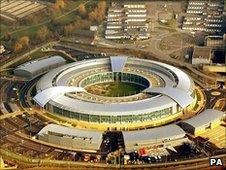'Too few ethnic minority officers' hired by GCHQ
- Published

GCHQ said it had tried to improve diversity and equality
Britain's secret eavesdropping centre, GCHQ, has been criticised for failing to recruit enough ethnic minority staff to help fight terrorism.
An official report, leaked to the Sunday Times, also said black and Asian intelligence officers had complained of discrimination at the complex in Cheltenham, in Gloucestershire.
A GCHQ spokesman told the BBC policies and practices were now being improved.
Much of GCHQ's work involves monitoring calls and e-mails from terror suspects.
But the report,, external authorised by the head of the civil service, Sir Gus O'Donnell, says a lack of officers with specialist knowledge of languages like Urdu and Arabic is hampering efforts to spot codes and cultural nuances in intercepted conversations.
"It is critical to have a diverse staff group who are able to profile and recognise certain behaviour patterns and communications," the document says.
The report recommends better engagement with ethnic minority communities in order to boost recruitment and improve the image of the organisation.
"This is critical to good national security intelligence," it adds.
The report says GCHQ has tried to improve its equality and diversity, but "the culture of the organisation has not been receptive to this" and it "is seen as a people issue which only applies to some people". It points out that there are no black or Asian senior managers.
Several dozen ethnic minority intelligence officers were interviewed during its preparation, and among the complaints recorded was: "I wasn't born here and although I have been security cleared, I am constantly challenged about my loyalty to Britain by my colleagues."
Another employee said: "The security officers ask questions which are culturally inappropriate, insensitive and offensive."
A third said they felt that ethnic minority employees had to work harder than white colleagues "and for less reward".
Targeted recruitment
The director of communications at GCHQ, Chris Marshall, said the organisation had "long recognised that strict nationality and residency requirements for staff, and the specialist nature of our work, have made it challenging to develop a workforce which represents the diversity of the UK population".
He said the organisation had tried to improve things with a targeted recruitment campaign, but a review in 2009 "reflected that GCHQ continued to fall short in meeting our targets".
Mr Marshall said that in response to it, GCHQ was "making a number of improvements to our policies and practices", including employing a dedicated diversity officer and focusing recruitment on specific universities with large ethnic minority populations.
"GCHQ is regularly recognised as a good employer but we aspire to be the best," he said. "We recognise that recruiting a diverse range of people, treating them in a non-discriminatory way and supporting them to achieve their full potential is key to that aspiration."